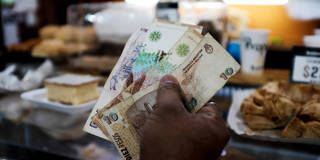 Tomas Cuesta/Getty Images
Tomas Cuesta/Getty Images
如何从下一场危机中拯救新兴经济体
发自首尔——当全世界都在努力应对由新冠疫情、中美贸易摩擦和乌克兰战争引发的通胀激增时,美国已经确定了它的对策:加息。然而此举虽然可能有助于平抑美国的物价增长,但这一高利率却加剧了其他国家(尤其是新兴经济体)的通胀压力。
通过提高利率,美联储正在将主要来自于新兴经济体的资本引向美国经济。随着资本流入推动美元升值,资本外流正在拖累新兴经济体货币。自今年年初以来韩元已贬值18%,埃及镑贬值20%,泰铢贬值15%,印度卢比贬值8%,人民币贬值13%。
与此同时新兴经济体的通胀率也在飙升。尼日利亚通胀在8月创下了20.5%的17年新高,埃及通胀率已接近15%,而阿根廷今年的通胀率预计将超过100%。虽然很难将美国的货币政策归为唯一的因素,但它会无疑使事情变得更糟。
https://prosyn.org/UuujEOfzh
To continue reading, register now. It’s free!
Register Now
Already have an account?
Log in



发自首尔——当全世界都在努力应对由新冠疫情、中美贸易摩擦和乌克兰战争引发的通胀激增时,美国已经确定了它的对策:加息。然而此举虽然可能有助于平抑美国的物价增长,但这一高利率却加剧了其他国家(尤其是新兴经济体)的通胀压力。
通过提高利率,美联储正在将主要来自于新兴经济体的资本引向美国经济。随着资本流入推动美元升值,资本外流正在拖累新兴经济体货币。自今年年初以来韩元已贬值18%,埃及镑贬值20%,泰铢贬值15%,印度卢比贬值8%,人民币贬值13%。
与此同时新兴经济体的通胀率也在飙升。尼日利亚通胀在8月创下了20.5%的17年新高,埃及通胀率已接近15%,而阿根廷今年的通胀率预计将超过100%。虽然很难将美国的货币政策归为唯一的因素,但它会无疑使事情变得更糟。